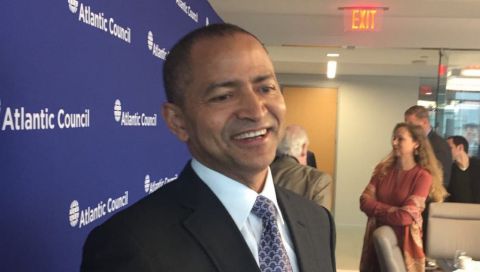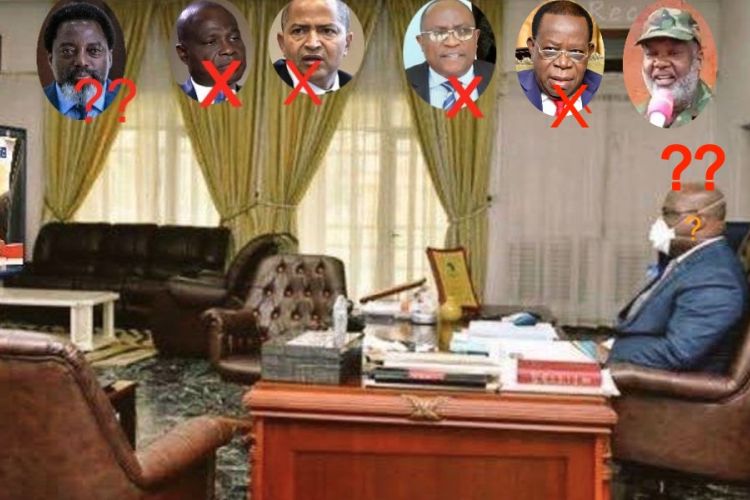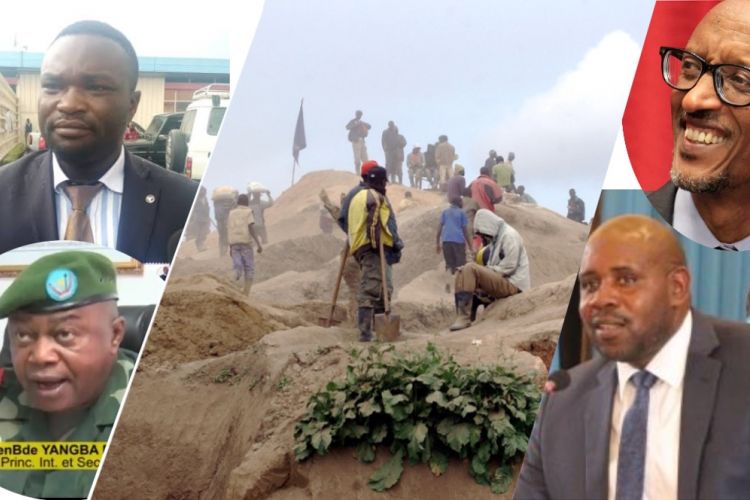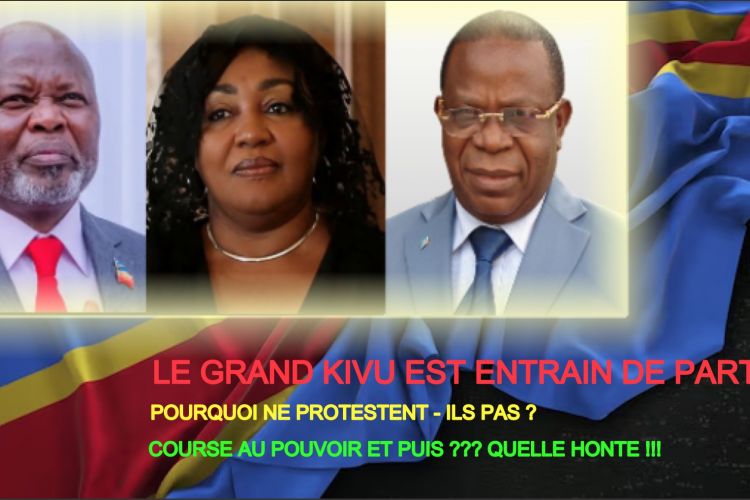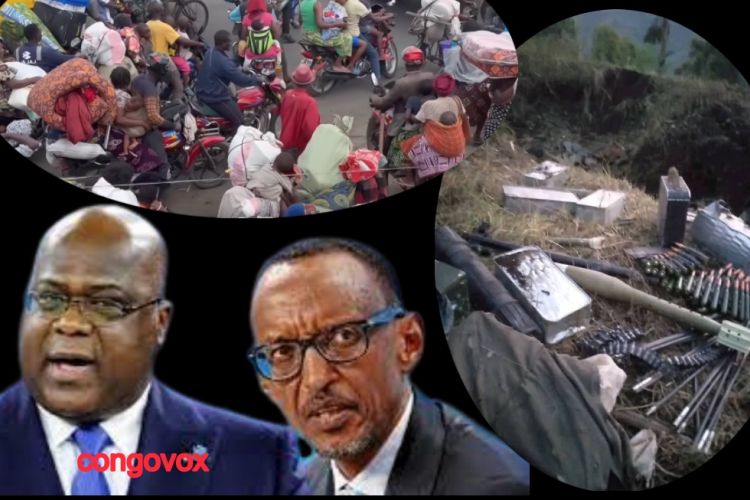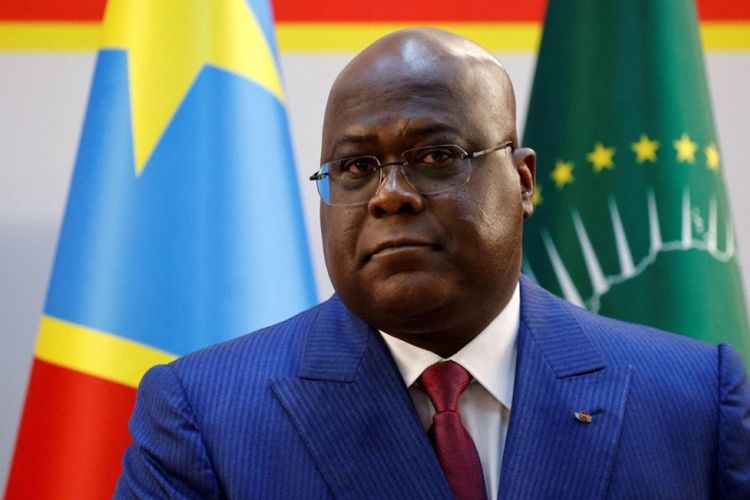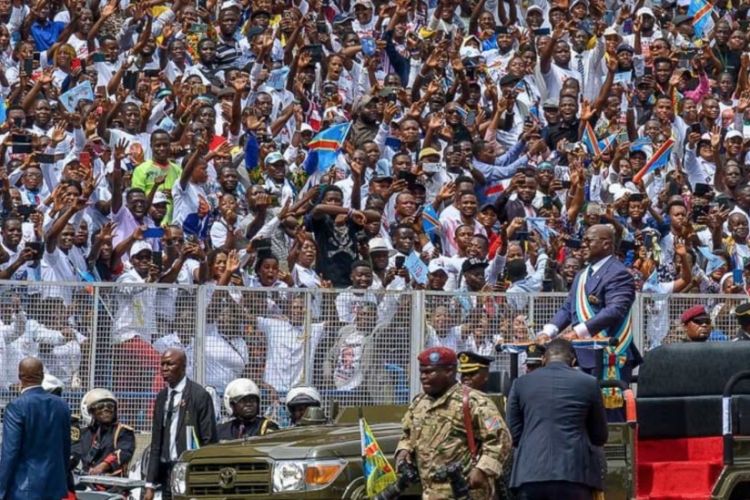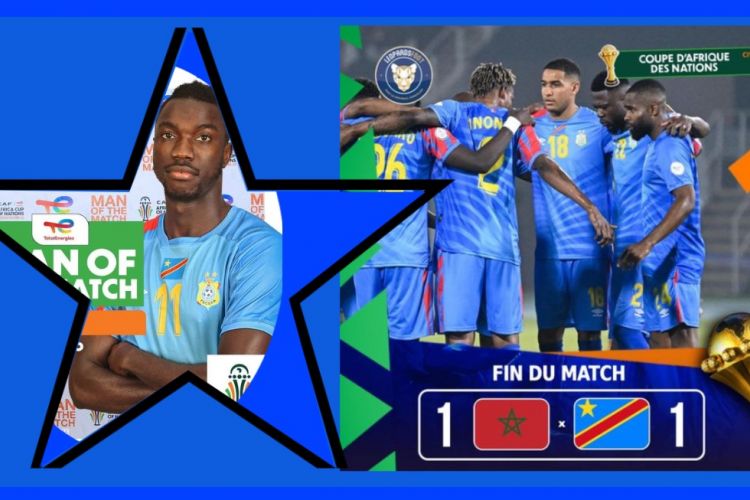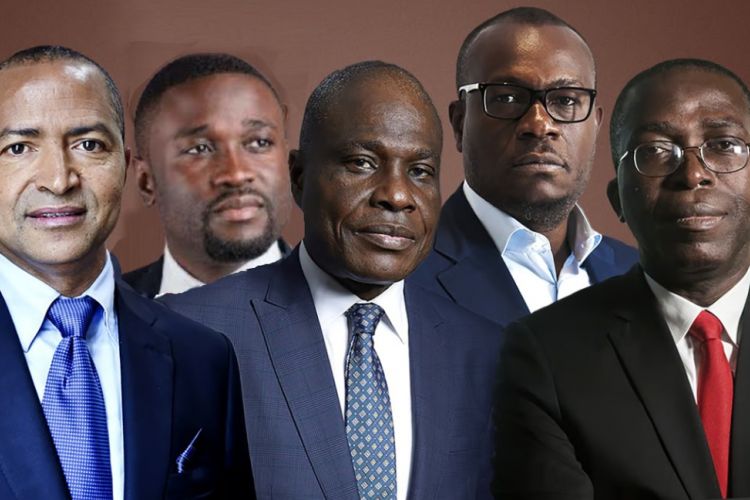DEPUIS WASHINGTON : « NOUS N’ALLONS PAS ACCEPTER QU’UN GROUPE D’INDIVIDUS S’ETERNISE AU POUVOIR », MOISE KATUMBI
Discours à l’Atlantic Council
Remarks as prepared, in French.
INTRODUCTION
· Bonjour à tous, bonjour Dr. Pham de m’accordé la parole. Je suis heureux de m’adresser à nouveau devant vous à l’Atlantic Council.
· Je sais que tout le monde assemblé dans cette salle est soit un ami du Congo ou a un intérêt spécial à voir dans mon pays le premier transfert démocratique du pouvoir sans effusion de sang.
· Aujourd’hui le Congo – et tout particulièrement l’Est du pays – est endeuillé. Des innocents sont massacrés tous les jours dans des conditions atroces. Il y a quelques heures, une trentaine de compatriotes ont été sauvagement tués. En leur nom et celui des milliers de victimes qui sont victimes de violences atroces, je vous prie de vous lever pour en leur mémoire respecter une minute de silence.
· Please rise for a moment of silence in memory of the victims.
· Ce drame de l’Est réveille la conscience dans le monde entier. Il est intolérable, inacceptable, injustifiables que les femmes et enfants, jeunes et vieux, continuent à vivre dans la peur sans que nous puissions leur assurer le droit le plus élémentaire que de nous mettre ensemble debout pour dénoncer et arrêter par toutes voies la barbarie et la sauvagerie qui ont élu domicile en RD Congo.
· Je voudrais remercier tout de suite l’administration Américaine, les deux chambres pour le passage de résolutions, ainsi que le travail effectué par les ONGs, notamment Ida Sawyer d’Human Rights Watch, pour son courage et son engagement, the Enough Project, ainsi que les ONGs locales et internationales.
· Malheureusement, depuis mon dernier discours en juillet, la situation politique, économique et sociale de mon pays s’est aggravée.
· Le Président Kabila ne donne aucun signe de bonne foie quant à l’organisation des élections et s’accroche au pouvoir et ainsi bafouer la Constitution.
· Il réussira si le monde ferme les yeux. Je suis ici aujourd'hui pour exhorter les États-Unis et les autres pays démocratiques à ne pas détourner leurs regards.
RAPPEL DU CONTEXTE
J’aimerais commencer en vous présentant rapidement le contexte ;
1- Depuis un an, le gouvernement n’a pas pris la moindre disposition, matérielle ou administrative, pour préparer les élections prévues par la Constitution. Bien au contraire, le régime a accentué son caractère corrompu, intolérant, répressif et violent. Voilà pourquoi la Majorité Présidentielle n’a jamais désigné un dauphin au Président Kabila au cas où il y est élection
2- La corruption gangrène notre pays et l’ensemble de ses institutions, y compris la CENI qui a été mise en cause par l’ancien directeur d’une banque qui appartient à la famille du Président et qui a été révélée par le journal belge Le Soir dans plusieurs opérations douteuses et l’existence de comptes parallèles. Des dizaines de millions de dollars ont été détourné au détriment de cette institution.
3- La répression et la violence augmentent sensiblement, à l’image des pires dictatures de l’Histoire. Les manifestations sont interdites, les militants des Droits de l’Hommes et opposants politiques sont arrêtés et emprisonnés quand ils ne sont pas tués. Les médias privés d’opposition sont fermés, les médias nationaux comme Radio Okapi (la radio de l’ONU) et internationaux, comme la BBC, sont brouillés. D’autres sont suspendus comme RFI depuis plusieurs semaines.
4- La CENI que vous avez reçu ici avec un conseiller du Chef de l’Etat (alors qu’elle est censée être une institution indépendante), devait convoquer le corps électoral le 19 septembre 2016. Elle ne l’a pas fait. Cela a provoqué des manifestations massives dans tout le pays qui ont été réprimées dans le sang. Nous déplorons une centaine de morts.
5- Depuis, les arrestations se multiplient ; les jeunes du « Rassemblement », de Lucha, de Filimbi, des opposants tels que Moïse Moni Della, Jean-Claude Muyambo, prisonnier politique, Président de parti d’opposition ou Bruno Mavungu le secrétaire général adjoint de l’UDPS. Notre ancien Président de l’Assemblée Provinciale, Gabriel Kyungu, est menacé d’arrestation pour outrage au Chef de l’Etat. Sa seule faute ? Avoir demandé au cours d’un meeting populaire au Président Kabila de quitter le pouvoir le 19 décembre 2016 tel que prescrit par la Constitution.
LA STRATEGIE DU REGIME
1- Le régime a organisé un « dialogue national » factice, non inclusif, qui a débouché sur un accord unilatéral, en prévoyant l’organisation de l’élection présidentielle en 2018. Cet accord ne fixe pas de date précise pour l’élection et ne fait pas mention de l’obligation constitutionnelle du Président Kabila de ne pas se représenter pour un troisième mandat.
2- La majorité présidentielle parie sur un relâchement de la pression nationale et internationale pour changer la Constitution de manière définitive et permettre à Joseph Kabila de se maintenir au pouvoir.
LA POSITION DE L’OPPOSITION CONGOLAISE A LAQUELLE J’APPARTIENS
1. Un engagement solennel du Chef de l’Etat
Le Président de la République arrive en fin de mandat le 19 décembre 2016. Il doit prendre l’engagement qu’il ne briguera pas de nouveau mandat et qu’il ne tentera pas de changer la Constitution.
2. Des mesures de décrispation politique et de confiance
Nous appelons le pouvoir à décrisper l’espace politique par les actions immédiates :
· libérer sans conditions les prisonniers politiques et militants des droits de l’Homme, abandonner les poursuites judiciaires injustes et motivées par des raisons politiques
· permettre le retour en toute sécurité des opposants politiques, arrêter toutes formes d’harcèlement, et de menaces contre les membres de l’opposition et abandonner les tracasseries fiscales et administratives
· supprimer et interdire le dédoublement des partis politiques
· lever toutes les entraves à la liberté de la presse, la seule presse fonctionnant aujourd’hui est la presse du pouvoir
· permettre la liberté de mouvement, de manifestation et d’expression de tous, y compris les membres de l’opposition
3. Un accord politique de transition initié par la CENCO
Des négociations directes et inclusives initiées par la CENCO et soutenues par la communauté internationale doivent aboutir à un accord politique de transition.
EN CONCLUSION
La RDC n’est pas la propriété privée d’un seul homme ou d’un groupe d’individu. Le président Kabila peut encore sortir par la grande porte.
La RDC est le bien commun de tout un peuple ; un peuple qui aspire à la démocratie, au respect de sa Constitution et à l’alternance pacifique. Ce peuple congolais ne tolérera jamais qu’une dictature s’installe à nouveau dans son pays. Je ne le tolèrerai pas non plus.
J’appelle donc la communauté internationale, et en particulier les Etats-Unis, l’Union Africaine, l’Union Européenne et les pays membres de l’ONU à tout mettre en œuvre pour ancrer la RDC dans la démocratie. Il en va non seulement de la stabilité de notre pays, mais aussi de la sous-région de l’Afrique centrale, de la région des Grands Lacs et du monde entier.
Je vous remercie.
NOTE: These materials are distributed by DCI Group AZ, L.L.C. for Akin Gump Straus Hauer and Feld LLP on behalf of Moise Katumbi, and additional information is on file with the Department of Justice, Washington, DC.
Gov. Moise Katumbi
The Atlantic Council – Washington, DC
November 29, 2016
TRANSLATED REMARKS AS PREPARED
Translation is approximate.
Opening
· Hello to everyone and to Dr. Pham. Thank you for allowing me to speak here today. I am pleased to be at the Atlantic Council once again.
· I know that everyone here is a friend of Congo or has a special interest in seeing my country go through its first Democratic transition of power.
· Today, Congo, especially the Eastern part of the country is grieving. Innocents are being killed today in awful ways. A few hours ago, about 30 Congolese were savagely massacred. In their name and in the one of the many victims of violence, I invite you to stand up in their memory in order to take a moment of silence.
· This tragedy in the East is a wake up a call to the whole world. It is unacceptable and unjustifiable that women and children, young and seniors, continue to live in fear without us being able to ensure the most elementary rights. We must stand together to denounce the barbary and slaughter that are now a fixture in DR Congo.
· I would like to thank the American administration, and both chambers of Congress for passing resolutions in support of the democratic transition in the DRC; as well as the work done by NGOs, notably Ida Sawyer of Human Rights Watch, for her courage and engagement; the Enough Project; as well as local and international NGOs.
· Sadly, since I spoke here in July, the political, economical and social situation in my country has only become more serious.
· President Kabila is showing no sign of organizing the elections as he tightens his grip on power and ignores the Constitution.
· He will only succeed in the end if the world looks the other way. I am here today to urge the United States and other democratic countries to not look the other way.
Summary of the Current Situation
I would first like to remind you of the current situation:
1. Since about a year ago, the Government has not taken a single step, physical or administrative, to prepare for the elections as required by the Constitution. On the contrary, the current regime has become more corrupt, intolerant, repressive and violent. The ruling party hasn’t even named a candidate to succeed President Kabila in the event elections were to occur.
2. Corruption infects our country and many institutions, including CENI (the National Independent Electoral Commission). A former director of a bank owned by President Kabila’s family member, highlighted the corruption, which was also revealed in the Belgian Newspaper Le Soir. The corruption included many dubious operations, parallel existing accounts, and tens of millions of dollars.
3. The repression and violence continues to rise, similar to the worst dictatorship of history: peaceful political demonstrations are forbidden; human Rights activists and political opponents are arrested and imprisoned, when they are not killed; independent and opposition media like Radio Okapi (United Nation’s radio); and BBC are muted; others, such as RDI are suspended.
4. The Atlantic Council recently met with a representative from CENI, along with a representative from the Kabila government (even though CENI is supposed to be an independent institution). CENI should have called for elections no later than September 19, 2016. They haven’t done so. This led to massive demonstrations throughout the country that resulted in hundreds of deaths and other injuries.
5. Since then, arrests are on the rise; young activists of “Le Rassemblement”, from Lucha, from Filimbi, opponents such as Moise Moni Della, opposition party President, Jean-Claude Muyambo, and Bruno Mavungu, Deputy Secretary General of the UDPS. Our former Regional Assembly President, Gabriel Kyungu has been threatened for outrage towards the President. His only crime? To have asked, during a popular meeting, that President Kabila leave on 19 December 2016 as it is written in the Constitution.
REGIME STRATEGY
1. The regime has organized an artificial and false “National Dialogue” that led to a unilateral agreement, claiming that the Presidential election will be held in 2018. This agreement doesn’t set a precise date for the election, and doesn’t mention the Constitutional obligation that President Kabila cannot run for a third term.
2. The Presidential majority is betting on less national and international pressures in order to change the Constitution for good, enabling Joseph Kabila to remain in power.
THE CONGOLESE OPPOSITION’S POSITION TO WHICH I BELONG TO
1. A formal promise from the President
The mandate of the President of the Republic comes to an end on December 19, 2016. The President must commit that he will not seek a new mandate, and that he won’t try to change the Constitution.
2. Measures to relieve political tensions and increase the public trust
We are calling for the Government to relieve tensions among the political landscape with the following measures:
· To free, without conditions, political opponents and human rights activists; to abandon unfair judicial proceedings and those motivated only for political reasons.
· To allow all political opponents in exile to return safely; to stop all forms of harassment, intimidations and threats against members of the opposition; to abandon taxation and administrative harassment.
· To delete and forbid the duplication of political parties.
· To remove all barriers to press freedom; the only press allowed today being the press controlled by the power in place.
· To allow free movement, right to organize demonstrations, and freedom of speech for all, including members of the opposition.
POLITICAL TRANSITION AGREEMENT INITIATED BY CENCO
Direct and inclusive negotiations initiated by CENCO, and supported by the International Community, must succeed in finding a political transition.
CONCLUSION
· The Democratic Republic of Congo is not the property of one man or a group of individuals. President Kabila can still leave with honor.
· It is the property of the People; one that aspire for Democracy, respect of the Constitution and to a peaceful transition. The Congolese People will never tolerate that a dictatorship settles in again in our country. I will not tolerate this as well.
· I call upon the International Community, particularly the United States of America, the African Union, the European Union and all members of the UN, to do everything possible to anchor democracy in the Democratic Republic of Congo.
· Thank you.

